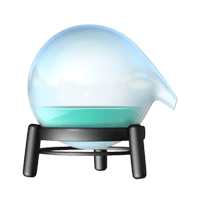北京市西城区2020-2021学年下学期初中七年级期末考试英语试卷
本试卷共九道大题,62道小题。满分90分。考试时间100分钟。
听力理解(共20分)
一、听下面四段对话,每段对话后有两道小题,从每题所给的A、B、C三个选项中选出最佳选项。每段对话你将听两遍。(共12分,每小题1.5分)
请听一段对话,完成第1至第2小题。
1. What colour does the woman’s daughter like?
A. White. B. Purple. C. Blue.
2. How much does the woman pay for the dress?
A. $45. B. $65. C. $90.
请听一段对话,完成第3至第4小题。
3. What are they going to do this weekend?
A. Visit their aunts. B. Stay at home. C. Make cakes.
4. When are they going to meet?
A. On Saturday evening. B. On Sunday morning. C. On Sunday afternoon.
请听一段对话,完成第5至第6小题。
5. Where does the woman want to go?
A. To the bookstore. B. To the art museum. C. To the supermarket.
6. How soon will she get there by bus?
A. In 10 minutes. B. In 24 minutes. C. In 30 minutes.
请听一段对话,完成第7至第8小题。
7. What kind of music does the girl like?
A. Classical music. B. Pop music. C. Rock music.
8. What do the two speakers think of music?
A. People can not live without music.
B. Music can help them to live a better life.
C. Listening to music can make them popular.
二、听独白,记录关键信息。本段独白你将听两遍。(共8分,每小题2分)
请根据所听到的独白内容和提示词语,将所缺的关键信息填写在相应位置上。
How to stop losing things | |
Have a routine (常规做法) | ♦ Be 9 to put your things in the same place |
Don’t put your things down | ♦ Bring your own bag if it’s not comfortable to 10 your keys or phone |
Make your things easy to find | ♦ 11 your dark phone cover to a bright one |
Tidy your house and | ♦ Keep everything in order to help you find things easily |
知识运用(共 18 分)
三、单项填空(共8分,每小题0.5分)
(一)从下面各题所给的A、B、C三个选项中,选择可以填入空白处的最佳选项。
13. — Whose camera is this?
— Oh, it’s _______. Thank you!
A. me B. my C. mine
14. — Excuse me! _______ you show me your train tickets?
— Certainly! Here you are.
A. Can B. May C. Must
15. We usually celebrate the Dragon Boat Festival _______ May or June.
A. on B. in C. at
16. There _______ many little libraries in our town in the 1990s.
A. are B. was C. were
17. — Lily, who is your favorite writer?
— Mark Twain. I like him _______ he wrote many interesting stories.
A. but B. because C. or
18. — Henry, what did you do yesterday?
— I _______ a movie called Peter Rabbit 2.
A. watch B. watched C. will watch
19. I _______ a delicious meal for my parents tomorrow.
A. am going to cook B. cook C. cooked
20. — What a wonderful painting! _______ did you buy it?
— In the Palace Museum.
A. Why B. When C. Where
21. In the future, people _______ 4D printers to print anything they want.
A. will use B. are using C. use
22. _______ litter into the right dustbin (垃圾桶), please.
A. Put B. To put C. Putting
23. As a fan of music, Jack often _______ the violin in his free time.
A. is playing B. plays C. will play
24. China’s Tianwen-1 _______back its first picture of Mars (火星) a few months ago.
A. will send B. sends C. sent
(二)根据短文内容,从各题所给的A、B两个选项中选出正确选项。
A
When dad and grandpa were children

Do you think a child’s life was different in the past? When my dad was a boy, he helped his mum with jobs in the house every weekend. She gave him $1 each time. When he had the money, he bought a football. It 25 really cool.
My grandpa’s family was poor. To have some pocket money, he got a Saturday job at a restaurant. He 26 the dishes (餐具) and the floor. Finally he bought a bicycle and went everywhere on it!
25. A. is B. was
26. A. washes B. washed
B
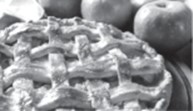
The apple pie
One Saturday, Lily asked her mother if they could make an apple pie. “Yes,” said her mother, “but we will need some apples.”
“I 27 to Grandma’s farm and pick some,” said Lily. Soon Lily picked four red apples. On the way home, Lily 28 a horse, a cow, and a pig in Grandma’s field. She gave each animal an apple. When Lily got home, her mother looked in the basket and said, “One apple? We can’t make a pie with one apple.” Lily laughed.
27. A. will go B. go
28. A. sees B. saw
四、完形填空(共10分,每小题1分)
根据短文内容,从方框中选出恰当的词语填空。每词只能填一次。
A
successful (adj.) began (v.) board (n.) company (n.) |
Eric Koston is a famous skateboarder (滑板运动员). He was born in Thailand. His family moved to the US when he was a baby. His love of skateboarding 29 when his older brother gave him a skateboard. It was an old 30 , but he learned how to skateboard by watching other kids and then he practiced by himself every day.
Three years later, he was so good that a 31 that made skateboards offered (提供) him a summer work. Since then, Eric has won many competitions (比赛) and made boarding videos. Now he has a 32 company making sports shoes and clothes.
29. _______ 30. _______ 31. _______ 32. _______
B
classical (adj.) singer (n.) wrote (v.) songs (n.) famous (adj.) studied (v.) |
Nina Simone
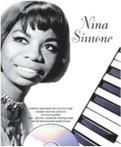
Nina Simone was one of the best musicians of the 20th century. She sang folk (民谣), blues, and jazz music. Nina told stories with her 33 . She also sang about ideas important to her.
At a very young age, Nina showed interest in music. She started playing the piano when she was three years old. As a kid, she played the piano in her mother’s church. She also 34 classical music. She learned to play the music of great 35 musicians, including Beethoven and Bach.
As a 36 , Nina became famous for her beautiful, powerful voice. She put folk, blues, and jazz together to write many well-known songs such as I Put A Spell On You and My Baby Just Cares For Me. Nina Simone also 37 songs for African Americans’ equality (平等). Today, she is 38 as one of the key voices for African Americans.
33. _______ 34. _______ 35. _______ 36. _______ 37. _______ 38. _______
阅读理解(共30分)
五、阅读下列短文,根据短文内容,从短文后各题所给的A、B、C、D四个选项中选出最佳选项。(共24分,每小题2分)
A
After-school clubs
Do you want to make your after-school life more colorful? Here are some good choices for you.
Outdoors Club
Sitting in a classroom for eight hours a day can be tiring. How about joining an outdoor club? Activities like skiing, swimming and picnicking are possible choices. You can take part in some of them to enjoy the adventures (探险). |
Creative (创造性的) Writing Club
Want to write short stories and be the next J.K. Rowling? A writing club is a good choice for you. Your writing skills can really improve as you will be able to practice writing and get helpful advice (建议) from other club members. |
Robotics Club
Machine learning and AI are hot topics today. Do you want to know more about them? Join the club to see if you can find your interest in this field. It might even help you get a good job. |
Soup Kitchen Club
In this club, you can work at a food bank or soup kitchen. You would be spending just a few hours at a time and giving food to people who really need it. It’s very helpful. |
39. If you love swimming, it’s a good idea to join the ________.
A. Outdoors Club B. Robotics Club
C. Creative Writing Club D. Soup Kitchen Club
40. In the Creative Writing Club, you can ________.
A. meet J.K. Rowling B. learn writing from AI
C. enjoy the adventures D. get advice on writing
41. The Soup Kitchen Club is a good choice for you to ________.
A. find interests in cooking B. get a good job in the future
C. help people who need food D. enjoy skiing with your friends
42. By joining these clubs, your after-school life will be ________.
A. healthy B. colorful C. creative D. relaxing
B
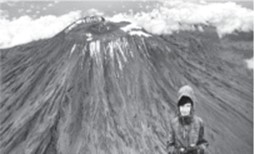
Go for it!
In eastern Africa, a volcano (火山) rises more than 19,000 feet into the sky. It’s Mount Kilimanjaro, one of the world’s tallest mountains. Every year, thousands of people try to climb to the top. Fewer than half succeed.
Montannah Kenney of Texas was one of the few who succeeded. She climbed the mountain with her mom last year, when she was just 7! She was one of the youngest climbers ever to get to the top. “It felt great to reach my goal (实现目标) ,” Montannah said.
Her adventure began about two years ago. Montannah found out her mom was planning to climb Kilimanjaro. She asked to go too. “I wanted to see what it was like above the clouds,” she said.
The Kenneys knew it was important to be prepared. They practiced climbing on hills near their home. And they did a study. They found that they had to be ready for all kinds of weather. The bottom of Kilimanjaro is warm, but the top is snowy and cold. The Kenneys also learned that climbers can get altitude sickness (高原反应), because of climbing very high too quickly. So they planned a route that would help them go slow.
Montannah and her mom started in March, 2018. Guides showed them the way. On the six-day climb, they climbed for nine hours or more each day. And it rained or snowed almost the whole time.
One day, Montannah felt sick to her stomach (恶心). She and her mom worried it might be altitude sickness. They thought about turning back. But after resting for a bit, Montannah felt better. She refused (拒绝) to give up. Two days later, she made it to the top of the mountain. “I was finally above the clouds!” she said.
43. When Montannah was 7, she ________.
A. became the first climber B. had a trip in Texas with her mom
C. began to study eastern Africa D. climbed to the top of Kilimanjaro
44. From Paragraph 4, we can know ________.
A. the weather there was nice B. the family really needed others’ help
C. it was important to get ready D. Montannah finally reached her goal
45. What happened to Montannah when climbing?
A. She got lost on the way. B. There was little food to eat.
C. She didn’t feel very well. D. There wasn’t a safe place to rest.
46. Montannah’s story tells us ________.
A. when facing difficulties, set a new goal
B. if you want to reach your goal, work for it
C. the top of the mountain is the most beautiful
D. children should learn how to climb mountains
C
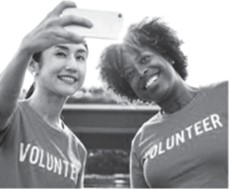
Some people think kindness (善行) is something completely selfless (无私的) that we do out of love and care, while others believe it is just a clever way to become more popular and get something good. However, a study shows that being kind to others can actually make us happy in different ways. In fact, even just thinking about our kindness in the past may make our mood (心情) better. But why and how does kindness make us so happy? Let’s learn about it.

Contagious (有感染力的) smiling
Being kind can make someone smile and if you see that smile for yourself, it might be enjoyable. A study says that seeing someone else show a feeling naturally makes the same parts of our brains start to work, as if we had the same feeling. For example, you may find yourself laughing just because someone else is laughing.

Righting a wrong
Sadness can also be contagious. When someone else feels bad, it could also make us feel down. This is quite true for close friends and family. Doing a kind act ( 行 为 ) can make someone sad feel better. This can also make us feel good because we are putting something right.
 ___________________________
___________________________
Being kind opens up many different ways to start a social connection with someone. Kind acts, like buying someone a thoughtful present or even just a coffee, build up friendships, and that in itself can better our mood. Volunteering (志愿服务) also opens up new groups of people to connect with, both other volunteers and the people you are helping.

Kindness comes back around
A psychology study shows that being kind to others may give in return. Someone might remember that you helped them out last time, and they’ll be more likely to help you in the future. Also, one person being kind can make others in the group kind, too. For example, if you make cakes for your co-workers, it will catch on, so someone does it each month. That is more days you’re getting cakes than giving them.
The story doesn’t end there. Being kind may better your mood, but a study has also shown that being in a good mood can make you kind. This makes it a wonderful two-way street.
47. The study in Paragraph 1 shows _______.
A. everyone is completely selfless
B. kindness can make us feel happy
C. love and care are helpful in our life
D. we can use kindness to become rich
48. _______ is an example of a kind act.
A. Leaving someone who feels bad B. Working in a shop to make cakes
C. Laughing at someone around you D. Joining a group to be a volunteer
49. Which of the following can be the best title for Paragraph 4?
A. Making connections B. Opening up a group
C. Helping other people D. Building up friendships
50. What can we learn from the passage?
A. One can get success in a good mood.
B. We do kind acts to get them in return.
C. Kindness makes us and others feel good.
D. It’s difficult to help other people be kind.
六、阅读短文,根据短文内容回答问题。(共6分,每小题2分)
Body language across the world
It’s well-known that we all send messages through body language, however, sometimes it can be easy to forget that each culture has its own body language. Understanding (理解) body language in other countries is key to successful communication (交流), especially when we know nothing about a foreign language.
Eye contact (接触)
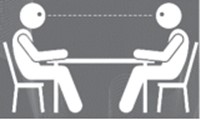
In many countries such as in the USA, Australia or UK and in Western Europe, looking the person in the eyes when talking shows your respect (尊敬) for the speaker. It means that you are interested in and paying attention to what is said. However, in other cultures in Asia, too much eye contact is not polite and even disrespectful.
Handshakes
Shaking hands is a usual way to greet in many cultures. In Romania, for example, only men usually shake hands. And they do it every time they meet, not just the first! In England, however, it’s unusual to shake hands.
The “V” sign

In the United States, the “V” sign means “peace”. However, it can be very rude in other places such as the UK, Australia and South Africa when the back of the hand is facing the other person.
Head movements
In many countries, nodding your head usually means that you agree to something. But for Bulgarians and Greeks, it means quite the opposite. And in India, people move their heads from side to side to show they are actively listening.
Truly, each person is different and understands body language according to his or her culture and personal experience. So the best thing to do is to stay open-minded and learn more about other cultures.
51. How do you show your respect for the speaker in Western Europe?
52. What do people in India do to show they are actively listening?
53. Why is it important to learn body language across the world?
书面表达(共 22 分)
七、根据句意和音标填写单词。(共 4 分,每小题 1 分)
54. I usually [hʌɡ] my mother when she gets home.
55. The train will [əˈraɪv] at the station in 20 minutes.
56. Our math teacher Mrs. Lee is [strɪkt] but very nice.
57. There is a beautiful [ˈrɪvə] going through our village.
八、根据中文意思和英文提示词语写出句子。(共8分,每小题2分)
58. 为什么不看足球赛呢?(why not)
59. 在新的学校,我将会结识许多朋友。(make friends)
60. 12 岁时,Andy 骑自行车去上学。(ride a bike)
61. 昨天我花了1个小时做家务。(take, housework)
九、文段表达(10 分)
62. 请根据中文和英文提示,完成一篇不少于40词的文段写作。所给图片及提示词语仅供选用。请不要写出你的校名和姓名。
每位同学都有一些旅行的经历,如春游、秋游、假期旅行等。某英文网站正在开展题为 “A great trip” 的征文活动,请你写一篇短文投稿。内容包括:你旅行的时间、地点,旅行中你做了什么,为什么你认为这是一次很棒的旅行。
提示问题:● When and where did you go?
● What did you do during your trip?
● Why do you think it was great?
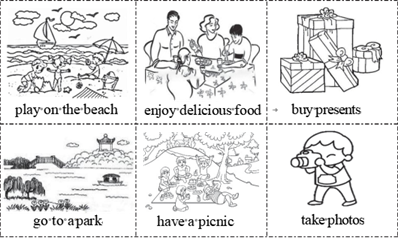
A great trip
______________________________________________________
______________________________________________________
______________________________________________________
附加题
试卷满分:20分
一、短文填空(共12分,每小题2分)
根据短文内容,从下面方框中选择恰当的单词,并用其正确形式填空。每词只能用一次,有一个是多余项。
sale (n.) problem (n.) get (v.) take (v.) safe (adj.) meaning (n.) easy (adj.) |
I’m not a shopaholic!
I don’t like shopping at all! I admit it. I hate ( 讨 厌 ) shopping because it 1 me lots of time, money and energy in the past.
In fact, I hate it so much that I only go clothes shopping once a year. I wait for the 2 to start, and then go into town to buy all my clothes for the year. I shop around for the cheapest things not the ones I like best. I try them on and, as long as they fit me, I buy them. I don’t keep the receipt (收据), as I know I won’t go back to the shop if there are 3 ! Also, I always pay cash, as I don’t want to get a huge credit card bill (信用卡账单) at the end of the month. And if I really need something, I do online shopping. And I usually have a shopping list. It’s very 4 —you can look through it at home and make your decisions without a shop assistant around you trying 5 you to buy something you don’t want!
So, in this way I can save much time to do something 6 to me.
1. _______ 2. _______ 3. _______ 4. _______ 5. _______ 6. _______
二、阅读理解(共8分,每小题2分)
阅读短文,根据短文内容,从短文后各题所给的 A、B、C、D 四个选项中, 选择最佳选项。
Should I have ten more minutes in bed? Do I wear the new shirt or the old one? Decisions (决定), decisions; they take up a lot of our thinking time.
It’s easy to become lost in decisions and it’s not surprising when you look at the numbers. While a child makes around 3,000 decisions a day, as you get older, you make about 35,000. More than two hundred of those decisions are about food. Besides that, our heads are filled with other choices about school, friends, and home. Sometimes, it seems that the easiest choice is to let someone else make the decisions for you whether you like it or not.
But I’m beginning to realize that you can learn how to make good decisions. There are ways to filter (筛选) your decisions and center on the important ones. For example, someone always wears a grey T-shirt. Do you know why? Well, it means they can center on important decisions and not spend a lot of time deciding what to wear. Although it might be important for you to wear the right shirt, you could probably make it easier by deciding what’s really important.
There are times when we seem to have little control ( 控 制 ) over the decisions we make. Picture this. You get a message from a friend that has upset (使烦恼) you. And you answer it without thinking it through which makes you feel good. However, you soon realize that you’ve been unkind and feel even more upset. A person reacting emotionally (情绪化地反应) often doesn’t make good choices.
So, how can you avoid (避免) making bad decisions? If possible, take time to “sleep on it” and consider the results. It’s also good to ask yourself how you’re feeling while you’re making the decision. If you don’t feel anything then be careful! That could be a sign that you aren’t making the correct decision. And my final tip: don’t make a decision on an empty stomach or when you’ve got “hanger”. That is the angry feeling you get when you’re hungry. After eating, you will be much more in control of your decision-making skills.
Despite all the advice out there, there will be times when you make the wrong decision, but that shouldn’t stop you from being natural and creative. The more decisions you make, the better you get at them, and then, you probably won’t make the same mistakes again!
7. It’s easy to become lost in decisions, because ________.
A. the number of decisions we make is exact
B. everyone makes lots of decisions each day
C. children like making decisions about food
D. we lose our heads in our school and home
8. The example in Paragraph 3 shows that ________.
A. it’s important for us to wear the right shirt
B. it’s easier for us to decide what to do next
C. we should center on our important decisions
D. we should spend little time making choices
9. Which of the following is TRUE about making decisions?
A. Filter your decisions and choose what you like most.
B. You’d better not make decisions when you’re hungry.
C. Making choices as soon as possible can be helpful.
D. Try to ask someone else to give you more advice.
10. What is the main purpose (主要目的) of the passage?
A. To tell us the right time to make good decisions.
B. To show us the advantages of making decisions.
C. To let us know the importance of making decisions.
D. To teach us some useful ways to make good decisions.
7. ________ 8. ________ 9. ________ 10. ________
参考答案
一、听对话,选出最佳选项。
1. B 2. A 3. C 4. B 5. B 6. C 7. A 8. B
二、听独白,记录关键信息。
9. sure 10. carry 11. Change 12. office
三、单项填空
13. C 14. A 15. B 16. C 17. B 18. B 19. A 20. C
21. A 22. A 23. B 24. C 25. B 26. B 27. A 28. B
四、完形填空
29. began 30. board 31. company 32. successful 33. songs
34. studied 35. classical 36. singer 37. wrote 38. famous
五、阅读短文,选择最佳选项。
A: 39. A 40. D 41. C 42. B
B: 43. D 44. C 45. C 46. B
C: 47. B 48. D 49. A 50. C
六、阅读短文,回答问题。
51. By looking the person in the eyes when talking.
52. People move their heads from side to side to show they are actively listening.
53. Because learning and understanding body language can help us communicate successfully with people all over the world.
(53小题,请老师们根据学生的答题情况酌情给分。)
七、根据句意和音标填写单词。
54. hug 55. arrive 56. strict 57. river
八、根据中文意思和英文提示词语写出句子。
58. Why not watch the football match?
59. I will make many friends in the new school.
60. Andy rode a bike to school at the age of twelve/when he was 12.
61. It took me one/an hour to do the housework yesterday.
(本大题重点考查所给词语的运用能力,包括时态和句子结构,句子的其他部分老师们根据答题情况酌情给分。)
九、文段表达
62. 参考范文:
Two years ago, during the summer holiday, I went to Sanya with my parents. It was a great trip.
On the first day, early in the morning, we went to the beach to watch the sunrise. It was wonderful. After that, I swam in the sea with my dad and made some sandcastles on the beach. My mom took lots of photos for us. In the evening, we enjoyed delicious local food. On the following days, we travelled around the city and bought some presents for my grandparents.
I really enjoyed the trip, because I not only got close to nature and relaxed myself, but also spent more time with my parents, which helped better our relationship.
文段表达评分标准:
说明:先根据文章整体内容确定档次,然后在该档次内评出分数。
第一档:(9-10分)
完全符合题目要求,观点正确,要点齐全。句式多样,词汇丰富。语言准确,语意连贯,表达清楚,具有逻辑性。
第二档:(6-8分)
基本符合题目要求,观点正确,要点齐全。语法结构和词汇基本满足文章需要。语言基本通顺,语意基本连贯,表达基本清楚。虽然有少量语言错误,但不影响整体理解。
第三档:(3-5分)
部分内容符合题目要求,要点不齐全。语法结构和词汇错误较多,语言不通顺,表达不够清楚,影响整体理解。
第四档:(0-2分)
与题目有关内容不多,只是简单拼凑提示词语,所写内容难以理解。
听力录音材料:
一、听下面四段对话,每段对话后有两道小题,从每题所给的A、B、C三个选项中选出最佳选项。每段对话你将听两遍。
请听一段对话,完成第1至第2小题。
M: What can I do for you, madam?
W: I’d like to buy a dress for my daughter.
M: What colour does she like? We have white, blue and purple.
W: Purple would be fine. It’s her favourite. How much is it?
M: $90. But it’s half price today, only $45.
W: OK! I’ll take it.
请听一段对话,完成第3至第4小题。
M: Hi, Mary! What are you going to do this weekend?
W: Nothing special. Just stay at home. How about you?
M: I’m going to learn something new, making cakes. Would you like to go with me?
W: Sounds great! But my aunt is going to visit us this Saturday. Are you free this Sunday?
M: Yes. I’ll be free then.
W: So, when and where shall we meet?
M: Let’s make it 9 o’clock on Sunday morning at Snow Bakery.
W: Ok. See you!
请听一段对话,完成第5至第6小题。
W: Excuse me! Could you tell me how to get to the art museum?
M: The art museum? It’s a little bit far, about 8 kilometers from here.
W: Oh, is there a bus I can take there?
M: Sure, there are a few buses that go there. Bus 5, 15 or 24.
W: Thank you! Where is the bus stop?
M: The bus stop is on the 4th street. You just need to go straight and turn left at the second crossing. Then you’ll see it in front of the bookstore, opposite the supermarket.
W: By the way, how often do the buses come?
M: Every 10 minutes, and it takes about 30 minutes to get to the art museum.
W: Thank you so much.
M: You are welcome.
请听一段对话,完成第7至第8小题。
W: Hi, Peter, are you listening to music?
M: Yeah, I love music. And I’ve got lots of music apps on my phone.
W: Tell me your favorite singer.
M: My favourite singer is Taylor Swift. I like pop music best. What kind of music do you like?
W: I like classical music. I also like old songs. Do you know these two songs “Country Roads” and “Don’t Stop Believing“?
M: Yeah, they’re very good.
W: I like Backstreet Boys, too. They’re a cool group.
M: How about U2? They are very popular.
W: Right. Some of their songs are easy listening. But some are heavy metal. I don’t like rock music.
M: It’s great that we both love music. I don’t know if anyone could live without music.
W: I agree with you. When I am down, music cheers me up. When I am tired, music relaxes me.
M: Yes. Music is our world.
二、听独白,记录关键信息。本段独白你将听两遍。
请根据所听到的独白内容和提示词语,将所缺的关键信息填写在相应位置上。
Hi, everyone! I’m Chris. Today I’d like to give you some tips about how to stop losing things. First, have a routine. The easiest way to find your things is to always know where they are. Be sure to put your things in the same place both inside and outside your house, and then they are much harder to lose. Second, don’t put your things down. Never put your things down when you’re out of the house. Bring your own bag if it’s not comfortable to carry your keys or phone. Third, make your things easy to find. 90% of the time when you lose something, it’s right there in front of you, you just can’t see it. For example, change your dark phone cover to a bright one. Fourth, tidy your house and office. It’s easy to lose something in a messy room. Keeping everything in order will help you find things easily.
附加题
一、短文填空
1. took 2. sale 3. problems
4. easy 5. to get /getting 6. meaningful
(1-6小题,词义正确得1分,词形正确得1分。)
二、阅读理解
7. B 8. C 9. B 10. D
